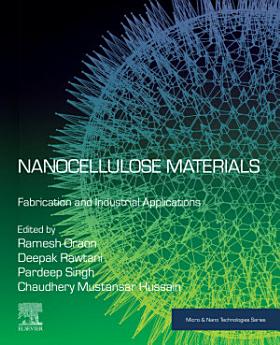Nanocellulose Materials: Fabrication and Industrial Applications
Despre această carte electronică
Despre autor
Ramesh Oraon is an Assistant Professor (Department of Nanoscience and Technology, Central University of Jharkhand, Brambe, India. His research areas are synthesis, functionalization, characterization of carbon materials, metal oxides, polymers and their electrochemical analysis for applications in energy storage, sensors, etc.
Deepak Rawtani, M.E., PhD, Chartered Engineer, has over 21 years of extensive research experience spanning private and government organizations. He is an accomplished researcher with a focus on molecular medicine, discovery biology, and nanobiotechnology. His career includes roles at the Industrial Toxicology Research Centre, Lucknow; USV Limited, Mumbai; and Torrent Research Centre, Gandhinagar. His primary research areas include forensic nanobiotechnology, with a particular emphasis on DNA–nanoparticle interactions and the functionalization of halloysite nanotubes for applications such as enzyme immobilization, drug delivery, and environmental remediation. Dr. Rawtani has authored over 120 papers and seven books in nanotechnology and environmental science, published in AQ1, a reputable international journal and publisher. He has been recognized among the top 2% of researchers worldwide by Stanford University for 2021, 2022, and 2023. Additionally, he is a NABL-empaneled Technical Assessor (ISO/IEC 17025) with the Quality Council of India.
Pardeep Singh is Professor and Head at the School of Advanced Chemical Sciences, Shoolini University, Solan, India. He is specialized in physical chemistry and heads a lab of research scholars who work on photocatalysis with the aim of generating new knowledge on graphene-based photocatalytic materials and processes to develop novel de-pollution treatments with enhanced efficiency and pilot-scale applicability. He is also exploring the generation of bio-waste material-based activated carbon for adsorption-based removal of aqueous phase pollutants.
Chaudhery Mustansar Hussain is an adjunct professor and lab director in the Department of Chemistry & Environmental Sciences at the New Jersey Institute of Technology (NJIT), United States. His research is focused on sustainability, nanotechnology & advanced materials, environmental management, analytical chemistry, and other various industries. Dr. Hussain is the author of numerous papers in peer-reviewed journals as well as a prolific author and editor of several books, including scientific monographs and handbooks in his research areas. He has published with ELSEVIER, American Chemical Society, Royal Society of Chemistry, John Wiley & Sons, CRC Press, and Springer.






